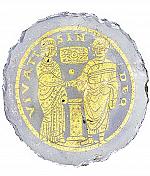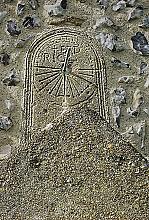“To life, not to luxury”

[Jean Auguste Dominique Ingres, Cartoon for the stained glass window of the Saint-Ferdinand Chapel: Saint Clement of Alexandria, 1842. Oil on canvas. Photo: René-Gabriel Ojéda—© RMN-Grand Palais / Art Resource, NY]
Keeping, then, to our aim, and selecting the Scriptures which bear on the usefulness of training for life, we must now compendiously [i.e., completely] describe what the man who is called a Christian ought to be during the whole of his life. We must accordingly begin with ourselves, and how we ought to regulate ourselves . . .
—Chapter 1, “On Eating”
SOME men, in truth, live that they may eat, as the irrational creatures, whose life is their belly, and nothing else. But the Instructor [i.e., the author] enjoins us to eat that we may live. For neither is food our business, nor is pleasure our aim; but both are on account of our life here, which the Word is training up to immortality. . . .
[Food] is to be simple, truly plain, suiting precisely simple and artless children—as ministering to life, not to luxury. And the life to which it conduces consists of two things—health and strength.
To this plainness of fare is most suitable, being conducive both to digestion and lightness of body, from which come growth, and health, and right strength—not strength that is wrong or dangerous and wretched, as is that of athletes produced by compulsory feeding. . . .
For “meats are for the belly,” for on them depends this truly carnal and destructive life; whence some, speaking with unbridled tongue, dare to apply the name agape [i.e., an agape meal or lovefeast] to pitiful suppers, redolent of savor and sauces. [They are] dishonoring the good and saving work of the Word, the consecrated agape, with pots and pouring of sauce. . .
They are deceived in their idea, having expected that the promise of God might be bought with suppers.
—Chapter 1, “On Eating”
LET revelry [i.e., noisy partying] keep away from our rational entertainments, and foolish vigils, too, that revel in intemperance. . . .
And let love, and intoxication, and senseless passions, be removed from our choir. Burlesque singing is the boon companion [i.e., close friend] of drunkenness. A night spent over drink invites drunkenness, rouses lust, and is audacious in deeds of shame.
For if people occupy their time with pipes, and psalteries [i.e., an instrument like a zither], and choirs, and dances, and Egyptian clapping of hands, and such disorderly frivolities, they become quite immodest and intractable, beat on cymbals and drums, and make a noise on instruments of delusion; for plainly such a banquet . . . is a theatre of drunkenness.
—Chapter 4, “How to Conduct Ourselves at Feasts”
FOR the apostle decrees that, putting off the works of darkness, we should put on the armor of light, walking honestly as in the day, not spending our time in rioting and drunkenness, in chambering and wantonness (Rom. 13:12–13).
Let the pipe be resigned to the shepherds, and the flute to the superstitious who are engrossed in idolatry. For, in truth, such instruments are to be banished from the temperate banquet, being more suitable to beasts than men, and [to] the more irrational portion of mankind.
—Chapter 4, “How to Conduct Ourselves at Feasts”
By Clement of Alexandria, translated by William Wilson, Ante Nicene Fathers, vol. 2
[Christian History originally published this article in Christian History Issue #147 in 2023]
Next articles
“What God has joined together”
Marriage, family, divorce, and adultery in early Christianity
David G. Hunter“Blessings out of number”
Good marriage and parenting according to John Chrysostom in the late fourth century
ChrysostomChristian History timeline: Everyday life in the early church
Some of the events shaping this issue in context
the editors







